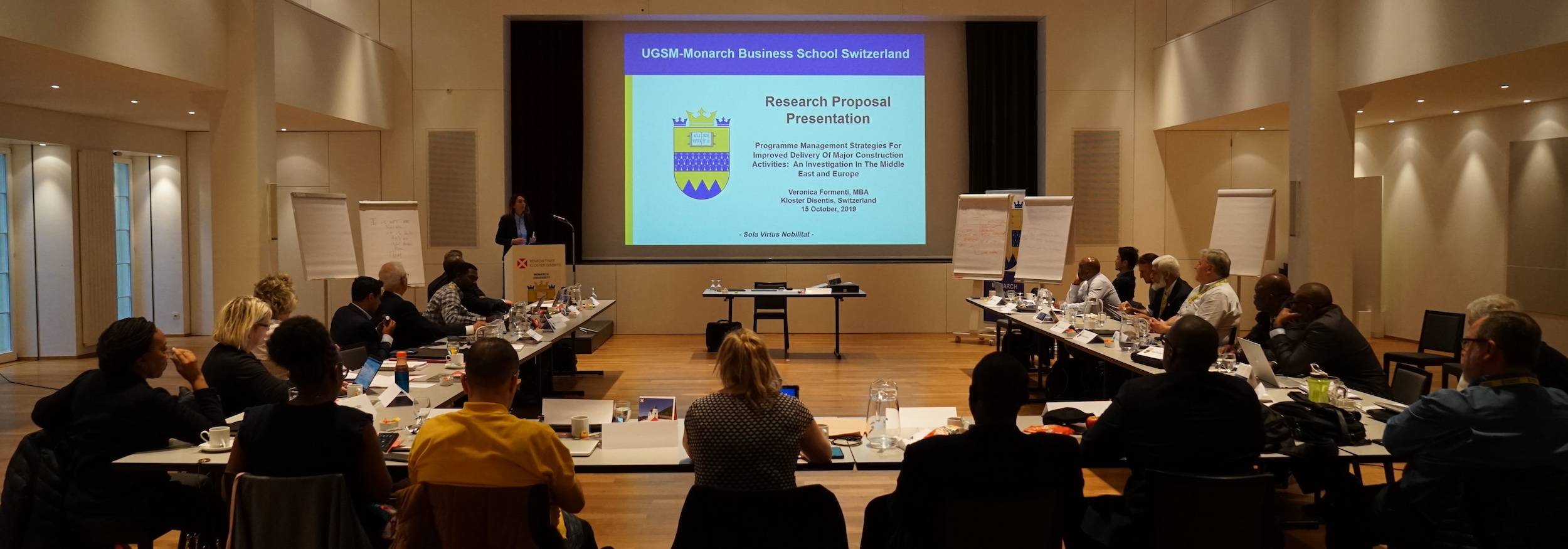
Dual MBA / MSC Combined Program
Your aspirations to reach new heights in the realm of business management are within reach through our innovative Dual MBA / Master of Science program. At Monarch, we recognize that your journey is unique, and that’s why we offer the Executive MBA in Global Management combined with the opportunity to earn a Master of Science in Business Research. This program grants you the dual distinction, equipping you with the knowledge and research skills to excel in your career and make a lasting impact in your field. Our program seamlessly integrates MBA coursework with the development of a Master’s level thesis, allowing you to explore a topic of personal interest within the domains of Management or Administration, providing both a practical and research-focused experience.
Our approach employs a dynamic blended learning methodology, merging the latest in management scholarship, real-world case studies, individual reflection, and rigorous graduate research skills development. Success in this program is defined not only by elevated managerial performance and effectiveness in your existing workplace but also by the cultivation and refinement of your research abilities in a managerial context. Our comprehensive coursework spans the essential aspects of applied management and empowers you to become a proficient practitioner. Topics include Communication, Authentic Leadership, Crisis Management, Judgement & Decision Making, Teamwork, Production Management, CSR & Ethics, Marketing Strategy, Innovation, and Global Strategy. The research component zeroes in on practical issues confronting contemporary management scholarship.
Join us in the Dual MBA / Master of Science program, where your career aspirations meet our commitment to excellence. This unique journey offers you the tools to tackle the complex challenges of modern business and elevate your expertise, all while contributing to the evolving landscape of management research. Welcome to a transformative experience designed to shape you into a leader who thrives in the ever-evolving world of business management.”

The Dual MBA / M.Sc. program provides the candidate with the best of both worlds. The Executive MBA component focuses on applied knowledge and its a integration within the real world of management. The M.Sc. component develops the graduate candidate as a researcher with the completion of an academic thesis on a practical issue of concern to management scholarship. By combining both applied and theoretical knowledge the program creates a well-rounded graduate who is able to seamlessly move between both the academic and business environments. The program is an excellent choice for those looking to function at the senior management and C-Suite level or provide expert advise within a consulting role.
Dr. Miray Barsoum - Director of the Master Programs
Module Sequence & Progression
The Executive MBA portion of the program contains 11 modules based on specific learning around important managerial knowledge domains. The Executive MBA portion is capped with a Global Strategy module. Participants begin with the first module of Effective Communication and move sequentially through the curriculum. Modules are of varying duration which creates the opportunity for quick progression between modules. The M.Sc. portion of the program includes two Research Skills modules to provide the candidate with the understanding and tools to complete research at a graduate level. The research skills courses culminate in the preparation of a research plan and ultimately the completion of the final M.Sc. manuscript.
Completion Requirements
The fully online Dual MBA / MSc Combined program is designed around Executive MBA modules of various lengths that introduce managerial concepts using different leaning methods and approaches. The short Executive MBA modules are complemented with academic Research Skills modules that moves the student through the completion of a research plan and ultimately the M.Sc. thesis work.
Module Duration & Descriptions
The Dual MBA / M.Sc. Combined program is designed for working professionals at a mid to senior level presently active or seeking to enter the professional arena. Graduation from the program requires the successful completion of all modules. There is no group work in the program. There are no exams as assessment in the MBA component is completed through various types of assignments and short essays. Assessment in the M.Sc. portion of the program is completed by way of the submission of the research plan and final thesis manuscript. Candidates have a maximum of 36 months to complete the program.
MBA Modules
This 3 week module provides candidates with a better understanding of the various aspects of Business Communications. The course objectives are achieved through a focus on Writing, Non-Verbal Communication and Speaking and Presentation Skills. Furthermore, it is crucial for managers to understand the importance of communication as it incorporates lessons learned across a wide spectrum of human knowledge.
This 6 week module provides candidates with a better understanding of the various aspects of modern-day Management Essentials. The course will focus learning on practical applications of modern management techniques. The course objectives are achieved through written assignments. Upon completion of this module, you will be able to effectively utilize corporate assets to achieve success.
This 3 week module presents candidates with a self-analysis in order to develop and apply personal strengths to effectively lead others in an organizational setting. The candidate will also learn why and how leadership competencies are important in achieving organizational success. The module follows the Monarch Personal Developmental Model of Learning (MPDML). The MPDML places emphasis on critical thinking and reflective practice for candidates to be held accountable for demonstrating leadership, applying and actively participating within their own development.
This 2 week module presents candidates with an overview of the critical aspects and concepts of crisis management. Crisis Management crosses the boundaries of multiple management domains (communication theory, corporate strategy, marketing, business law, organizational behaviour, change management, psychology, and leadership) and is a critical skill required of managers, particularly those at senior ranks. Being able to adequately contain and manage a crisis without making major errors in communication takes planning and a high level understanding of the situation, the organization, its environment and stakeholders. Being able to manage a crisis situation and turn it in to a positive for the company is the ideal outcome. The understanding that legal responsibility must be considered in relation to moral and ethical responsibility is of critical importance. Theory and module knowledge will be demonstrated through the analysis of a Monarch Crisis Management Case Study.
This 3-week course is designed to examine issues surrounding judgment and decision making (JDM) in an accounting setting. JDM considerations are found throughout all accounting environments and require a synthesis of both psychology and accounting literature and research. Judgment and Decision Making in Accounting is structured around an innovative framework that provides a unique way of thinking about JDM projects and organizing JDM research. Developed based on many years of teaching and research on accounting JDM, this unique framework succinctly describes the key issues in accounting JDM research, enabling readers to more quickly assimilate the vast material related to those issues. The framework also provides a basis to help readers evaluate their own current JDM research ideas, as well as generate further research questions.
This 4-week Production Management course is designed to introduce a student to the issues and approaches of managerial decision making that is critical to the success of a business operation. The course is structured to demonstrate a logical and rational development of the methods, models, and techniques of efficient and effective management of aspects of the production and delivery of manufactured and service products consistent with objective of achieving competitive advantage in a global environment. The topics covered in this course include strategy, product design, quality management and control, inventory management, lean and agile production, supply chain management, forecasting capacity management, aggregate planning, resource management, and other relevant areas, to enable a future manager or entrepreneur to make effective and competitive decisions for business success.
This 3 week module provides a contemporary perspective about the effect that the growing CSR, Sustainability and Ethics movement in business has on corporate performance and the unpredictable influences that outside forces have on the enterprise. The course examines the role that ethics have on business leaders and corporate cultures and the steps necessary to deal with alterations in the business environment and society. It also touches on transformation of CSR into social innovation.
This 6 week module is designed to enable students to analyze business situations from the point of view of the general manager, but more specifically with know-how understanding and confidence, to properly address the strategy of Management. Managers have responsibility for making strategic decisions and ensuring the long-term health of the entire firm or major division. The key tasks involved in general management include the detection of and adaptation to environmental change, the procurement and allocation of critical resources, the integration of activities across sub-parts of the organization, and, at the most senior levels, the determination of corporate purpose and direction. This module will also specifically focus on the role of change, its variables and deliverables and its intrinsic force to delegate and empower the entire concept of Management. The course makes use of an in-depth, multi-submission case study in order to provide an applied, hands-on application of strategy theory.
M.Sc. Modules
The Research Skills 1 module introduces the candidate to the important concepts of knowledge and how to evaluate research papers available through various academic networks. Research integrity, reliability and quality are the focus of the module. Upon completion of the module Candidates will be able to discern good quality research from poor. Candidates will be able to examine a chosen piece of research and critique the research based on the chosen method and methodology and whether the research achieved its stated goals and aims.
This module builds on the knowledge gained in the Research Skills 1 module and introduces the candidate to the Monarch Standard Research Method. The candidate will further investigate the important differences between quantitative and qualitative research and their appropriateness for specific applications within business research. The module emphasizes the use of phenomenological research methods as applied to business research. The module covers the important concepts of Literature and Methodological triangulation and its importance in ensuring greater reliability of research results. At the completion of the module the candidate will be able to design a piece of research and execute the field research component to the satisfaction of a graduate level requirement.
The research plan module focuses on the development of a 10 to 15 page research plan that outlines the intended research to be carried-out by the candidate. The research plan is developed with the assistance of the professor to ensure quality completion and understanding of the necessary components required of a graduate level academic research plan in business studies. Successful completion of the module is considered with the approval of the research plan by the Administration and the continuation of the program into the research phase.
The research phase of the M.Sc. portion begins with the successful completion of the research plan module. At this stage, the candidate continues the research portion of the program by executing the authorized research plan. The M.Sc. research manuscript is begun and is divided into four distinct sections that are developed as an integrated whole: 1. Introduction and Background of the Problem, 2. Literature Review and Critique, 3. Methodology and Data Presentation, 4. Synthesis and Summary. The M.Sc. manuscript is a scholarly piece of research. It should show mastery of the scholarly literature within the chosen domain and an understanding of graduate research methodology. Successful completion of the M.Sc. manuscript concludes the program and prepares the candidate for further academic or applied research within practicing management or academia.

The Dual MBA / M.Sc. program was a great experience. It challenged me to look at management practice and scholarship in a new way. I truly grew both as a practitioner and scholar. I enjoyed the program so much that I am continuing on to the Doctoral level with Monarch.”
Graduate, Arin Rwakajera, Uganda
The program is open to professionals with a Bachelor or Master degree from a recognized institution.
Participant progress is assessed through the submission of various assignments per module. There are no exams within the program.
A Master level thesis focusing on a managerial problem of interest to the candidate is completed. The thesis is to be approximately 80 to 100 pages
Candidates complete the program via the Monarch Digital Campus (MDC). This enables completion of the program 24 x 7 from anywhere. Asynchronous completion means you are not required to be on the platform at any specific time. Complete the program to fit your schedule.
Please see the main tuition page for further information.
Candidates from OECD developing nations are automatically provided a 50% discount on the standard tuition rate.
The program has rolling admission and may be started on the 1st of each month.
